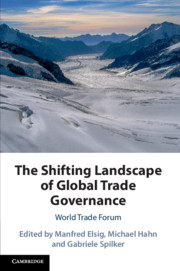Book contents
- The Shifting Landscape of Global Trade Governance
- The Shifting Landscape of Global Trade Governance
- Copyright page
- Contents
- Figures
- Tables
- Contributors
- Preface
- Abbreviations
- 1 Introduction
- Part I New and Old Challenges
- 2 The Elephant in the Negotiation Room
- 3 Corporate Strategy in Times of Anti-Trade Sentiment
- 4 Understanding and Shaping Trade Rules for the Digital Era
- 5 The Need for Better Disciplines on Rules of Origins in the WTO
- 6 For Whom the Bell Tolls
- Part II Trade Policy and Trade-Related Concerns
- Part III Development Angles
- Part IV Diffusion across Economic Treaties
- Index
- References
2 - The Elephant in the Negotiation Room
PTAs through the Eyes of Citizens
from Part I - New and Old Challenges
Published online by Cambridge University Press: 05 August 2019
- The Shifting Landscape of Global Trade Governance
- The Shifting Landscape of Global Trade Governance
- Copyright page
- Contents
- Figures
- Tables
- Contributors
- Preface
- Abbreviations
- 1 Introduction
- Part I New and Old Challenges
- 2 The Elephant in the Negotiation Room
- 3 Corporate Strategy in Times of Anti-Trade Sentiment
- 4 Understanding and Shaping Trade Rules for the Digital Era
- 5 The Need for Better Disciplines on Rules of Origins in the WTO
- 6 For Whom the Bell Tolls
- Part II Trade Policy and Trade-Related Concerns
- Part III Development Angles
- Part IV Diffusion across Economic Treaties
- Index
- References
Summary
In recent years, the negotiation of various trade agreements, such as the TPP, TTIP and CETA, has been accompanied by a large public backlash. Are we observing a paradigm shift in public perception of world trade or just temporary shifts in public support for the global economic order that oscillate around a more or less steady level? This chapter provides an overview of the major determinants of support for or opposition against PTAs and discusses how much room to maneuver policy makers have in designing such agreements. Furthermore, we discuss what policy makers can do to increase support for such agreements. We thereby focus on framing strategies and provide an analysis of which types of arguments are conducive to increase support for PTAs and how individuals process such information. This allows us to construct different future scenarios for policy makers to better align the negotiation and design of future trade agreements with the demand of their constituencies.
- Type
- Chapter
- Information
- The Shifting Landscape of Global Trade GovernanceWorld Trade Forum, pp. 17 - 47Publisher: Cambridge University PressPrint publication year: 2019
References
- 6
- Cited by



